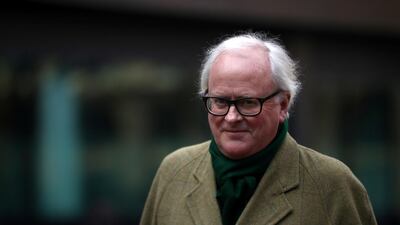Senior executives at British banking group Barclays lied about handing £322 million in secret payments to Qatar and its ruling family in return for investments to keep the bank afloat during the 2008 global financial crisis, a court heard on Wednesday.
Executives including former chief executive John Varley allegedly cooked up a fraudulent plan to pay higher-than-usual fees to Qatar in return for nearly £4 billion of funding – and then lied about the payments in official documents.
The four men – the most senior bankers to face criminal charges in Britain over conduct during the global financial crisis - hid details of the payments of £42 million and £280 million in “untrue and misleading” financial statements, a central London court was told.
The fees were paid to the Qatar Investment Authority and an investment vehicle controlled by former Prime Minister Sheikh Hamad bin Jassim bin Jaber Al Thani, a jury was told.
The court heard that the payments came after Barclays was “unavoidably” caught up in the 2008 global financial crisis that had sent British bank Northern Rock to the wall the previous year.
The executives turned to foreign investors to avoid the bank falling into government hands and potentially costing them “very large bonuses”, Southwark Crown Court was told.
It heard that one of the most significant investors was Qatar, which drove a hard bargain before agreeing to lend two tranches of £1.9 billion and £2.05 billion during 2008.
____________________
Read more:
Former Barclays bosses face London trial over Qatari cash call
British public sceptical of banks a decade after the financial crisis, survey finds
____________________
The deal saw Qatar Holding – part of the sovereign wealth fund – secure fees based on 3.25 per cent of their investment.
The fees were more than double the 1.5 per cent handed to other major investors including the China Development Bank, Singapore’s sovereign wealth fund and Japanese corporation Sumitomo, the court heard.
“Paying the Qataris more than the others was a problem,” said Edward Brown QC, prosecuting for the Serious Fraud Office.
The executives, however, accepted the higher Qatari fees as they were desperate to avoid the same fate for Barclays as rival UK lenders the Royal Bank of Scotland and Lloyds, which were bailed out by the British government.
The move would have taken Barclays – which can trace its origins back to 1690 – out of private hands.
The executives sought to disguise the scale of the capitulation to avoid the bank being shown to be “weak and vulnerable”.
The bank published a prospectus and other documents which failed to show the extent of the fees, the court heard. If the documents had shown the true position, they would have been forced to pay other investors similar amounts, a jury was told.
The reality of the position may have led to the complete failure of the entire capital raising operation designed to stave off financial crisis and the prospect of government control, the jury was told.
“It is no exaggeration to say that Barclays’ future as an independent bank was in jeopardy in September and October of 2008,” said Mr Brown.
“The Qatari money was essential and those within the bank at the time commented that without it the consequences would be dire – for the bank and personally,” he said.
The successful fundraising saw Barclays secure more than £11 billion emergency funds from international investors in 2008.
“The position presented was that that the Qataris were being paid at the same commission rate as every other investor… that was not true, say the Crown, and the conspirators all knew it to be a lie.”
The court was told that the Barclays board published two agreements that sought to provide cover for the payments which suggested they were for “advisory services” to be provided by Qatar rather than commission payments.
Prosecutors said the documents were designed as a “smokescreen” to hide the true nature of the fees. The conspirators recognised that it would be “inappropriate” for the Prime Minister of Qatar to be providing advisory services.
“They were simply a mechanism of paying the Qataris what they wanted,” said Mr Brown. “Whilst also hiding that fee from the wider world.”
Four former executives, including Mr Varley, went on trial on Wednesday accused of conspiracy to commit fraud by false deception
Mr Varley, 62, from west London, was joined in the dock by Roger Jenkins, 63, of Malibu, California, a former head of investment banking for Barclays in the Middle East.
Two other senior executives, Thomas Kalaris, 63, the former head of its wealth management division, and Roger Boath, 60, a former European divisional head, are also accused of conspiracy to defraud.
A fifth man, Christopher Lucas, the group’s former financial director, is also accused of being part of the conspiracy but is not on trial because he has long-standing health problems.
All four men deny the charges. The trial is expected to last for at least four months.


